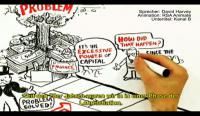The crisis in the U.S. and Europe is not a pure financial crisis, says Wolff. Especially in the U.S. wages have stagnated or even declined since the 70ies with increasing working hours. To keep the consumption going private households and the state had to build up huge debts while assets have concentrated more and more in a small group of capital owners. Instead of paying higher wages workers got loans from the capital owners. At the breakout of the crisis in 2007/2008 this construction collapsed. The system has no way of solving the problem. "The irony is that all the attention these days is on little Greece or Italy. But the much bigger problem is the U.S.", says Wolff. The States already have as debt more than their GDP. These growing debts are like a "big elephant" running towards Europe. But nobody wants to deal with that. The unprecedented Occupy movements have been very succesfull so far. They unite different movements, challenge the capitalist system and get sympathy from the majority of the population.
Richard Wolff: Professor of Economics Emeritus, University of Massachusetts, USA
Kontext TV: Welcome to KontextTV Richard Wolff.
Richard Wolff: Thank you very much for inviting me.
Kontext TV: Richard Wolff, talk first about the economic and financial crisis in the US. It's deepening right now, what are the causes for the crisis and how is this crisis in the US linked to the crisis in the Eurozone right now ?
Richard Wolff: Well, to begin it's the most serious economic crisis in the lifetime of the people alive in the US today. The only thing like it was the collapse of the 1930s, the great depression, which is 75 years ago, so there are very few people left who have a clear understanding of it. So it came as shock to the US, because it had been believed because of the ideology in the US, that we had a free enterprise market system that wouldn't have collapses, that wouldn't have this kind of a downturn, as we call it, that would last that long. We're in the 5th year of this, so the first thing is, it's a very severe economic downturn, it is lasting longer than anyone expected, it is cutting into the economic system much worse than was expected. So it's a major economic crisis and it's lasting so long that it has now produced a political crisis on top of the economic crisis like in Europe in many ways. Second, it is not a financial crisis, i.e. it is not produced by the banks, it is not produced by the financial economy, it is produced in the whole economy, it is as much a part of the non-financial as the financial. The reason it is called the financial crisis in the US is to comfort people it's a crisis limited only to part of the economy, rather than a crisis of the whole economy. Let me explain: For most of the history of the US we were a society in which wages rose, year after year, roughly from 1820 to 1970, 150 years, producing in the US the highest wages in the world, producing a belief that Americans have to this day, that they are in a special place, where you are rich if you work hard, where you will have your children live at a better standard than you and your grandchildren even better and so forth. All of that stopped in the 1970s when the long term labour shortage of the US ended. You have to understand that the reason the wages rose was we never had enough labour. We had a successful capitalism without workers. Partly because we killed all the Indians we found there when we first came as Europeans and afterwards that capitalism was successful and there weren't enough workers. Which is why we are a nation of immigrants. One after the other, but in the 1970s it stopped. The computer meant we didn't need people so much. American corporations moved out of the US in huge numbers for cheap labour elsewhere, i.e. China and India. And finally, the women's liberation movement moved millions of women into the labour market. So you had less demand for jobs, because of computers and export of work, and more people looking, women and more immigrants keep coming. The result was real wages stopped rising for the first time in US history as a country, since the 1970s, the real wage, the amount of money a worker gets adjusted for the prices that have to be paid is flat. This is a trauma is a psychological problem for a culture that has expected rising wages. No one discussed it in the 1970s, it was not recognised as a problem so every American family tried to solve it itself by doing two things: 1) More work. Americans work more hours of paid labour per year than any other advanced industrial country. About 20% more paid hours of labour per year than a German or a French or Italian would. That is a fundamental difference. And it meant over the last 30 years that the American worker is physically exhausted. Because the women leave the home for work, because the wages aren't going up, the families falling apart, because the women held it together and they are now exhausted too. But the most important thing is that working class in America, starting in the 1970s, to deal with the trauma of no more rising wages decided to keep on consuming as they had been promised they could, as they had promised to their children you'll have a college education, you'll have a car, you'll have a nice home and they borrowed the money. And for 30 years the American working class borrowed more money than any working class in the world ever borrowed. For their home, for their car, for their credit card, and for their university education. All students in the US now graduate with debt. 30 years ago almost no students had debts. So, by 2007 we had an exhausted working class. They couldn't work any more hours, couldn't borrow any more money, it couldn't send out any more people from the household to work. They were finished. And the rising economy was over and it collapsed. The economy built on rising consumption for 150 years couldn't any more, there was no way it was gonna happen. At the same time the wealth of America got shifted. For 30 years the wages were the same, the productivity of workers kept rising. So the workers produce more each year, better machines, more machines, new computers, faster labour, better training, so the worker-output delivered to the employer goes up for the last 30 years, every year. But what the employer did for the worker is flat for 30 years, because there is no longer a labour shortage. So you have the working class cannot get any more money, has to borrow all the money, to keep on consuming, but the employer class is wealthier than ever before, because they get all the gains of productivity for 30 years and they don't have to raise their wages, and has transformed the US. First the employer class has payed themselves fantastic salaries. Executives at the top of American corporations get much more, relative to Executives at the top of German or French or Italian corporations. They paid themselves this enormous sum of money. Number 2: They moved in to shape politics. They were smart. They understood that if they become relatively more wealthy and a mass of people don't you better control the political system or else the working class will use the political system to nullify what we are doing. So, American workers, who were exhausted with all their labour withdrew from politics. And the employers took all the extra money and moved in to shape politics. So that now the Republican and Democratic Party are both dependent on money of the same employer class, which is why whether you have Bush or Obama, the differences are very small. We have one party with to factions in the US and no opposition to handle the new problem of a highly unequal society. And so the crisis comes when the mass of people can not keep it going. And the rich have speculated on all the debts. For example, over the last 30 years the American working class borrowed more money - who did they borrow it from? From the employer. Because they were making the employer richer and richer, the employer lend them the money, instead of paying wages increasing, which is what they had done previously. So from an employers point of view, it was phantastic. You no longer raise the workers wages, instead you lend them money so they have to pay you back - and pay interest. But of course after 30 years as the debt of the working class goes up, but the underlying wage does not, you reach a point where you can't pay your debts. In 2007 the crisis begins, when masses of people can not pay their debts. It's a little bit like thinking of the American working class like the Greeks today. They can not pay. Their debts are impossible. And therefore the system has no way of solving the problem. The only way to enable the working class to resume consumption is to pay higher wages. The capital's class can't do that, doesn't want to do that, resists every effort to make them do that and the irony is, by doing this the capitalist's class undermines its own situation. And that's why the crisis is so severe. There is now way out without massive changes that the capitalist's class, the employers class, will not do. And so you have the situation and it is just as serious in the US as in Europe. In many ways more serious. The irony is, that all the attention, these days is on little Greece, or Italy. But the much bigger problem is the US. The debts of the US, of one country, are much larger than those of Greece, Spain, Portugal, Ireland, Italy, France combined. It is a peculiar situation, that the world's right now focused on Europe, southern Europe, when in fact the big problem coming down the road is the US. We already have as debt more than our GDP. When the trouble with Greece began their debt was 130% of GDP, ours right now, is already about a 105-110% and moving towards 135% fast. E.g. in 2011 the increase in our debt will be 10%. 1500 billion on a debt of 14500 billion. So roughly 10%. The estimated rate of economic growth of output this year: 2%. Our debt is rising five-times faster than our GDP. It's only a matter of two or three years before we are at, where Greece was, when the crisis in Greece began. But people are not looking at the situation, they're not accepting - because they don't want to - how serious the crisis is, not in the US. And here in Europe, because you're busy looking at your European problems, you don't see that there is a large elephant running towards you and sooner or later you gonna have to do something about this elephant.
Kontext TV: We are seeing protests all over the place, we are seeing the Occupy movements in the United States. Yesterday there was a general strike in Oakland, unprecedented strike one has to say. We are seeing protests in Greece and Spain. What are your thoughts on these movements. And where are they heading ?
Richard Wolff: I think the movements are successful in bringing an immense array of people together with very different issues, priorities, and programs. So they refuse to pick one or two, they're not going to tell us, and that's very very smart, because, they are gathering together 30 years angry about this problem, racial issue, economic issue, gender issue, whatever it is, they gather in the same movement. They have tried, little social movements for their own issue, it hasn't worked. In order to make real progress around gender, racial, ethnic, we have to get everybody together. We can only change the system if we are unified and have the strength of enormous numbers. And this is working. That's why people are coming together, they are not fighting each other. It should be that we fight for racial issues or it should be fight against the war in Iraq - no no no - they understand we are bringing everybody together. Later on we will worry about which issue when. But at first we have to be strong enough to make a difference. We're not gonna make the mistake of being fighting out and then separating and splitting - this group does this, that group does that. It is very important. And that's why they're so successful. Every attempt has been made by the police to repress it. Fail! The police had failed, including in Oakland. If you follow what happened in Oakland in a bad case of police over reacting, the mayor, who ordered the police in, went on TV the day after, mayor Quan, a woman, she said that she was sorry, she made a mistake, she should never have done that. The police chief is now openly fighting with the mayor. We haven't seen this before. There was a general strike yesterday, it was very successful, it closed the port of Oakland, one of the most important ports on the west-coast of the US, it had walkouts of public employees, private employees, there hasn't been a general strike of this sort in the US for at least a quarter of a century if not longer. This is the first one and it was quite successful. So, I think you're seeing a movement determined to grow, determined to question the whole thing. Let me make one more point. From the beginning this movement has said that it is against the entire system. It doesn't want a little change here the law changed a little bit. That's not the problem, the problem isn't this or that or the other. It is the system as a whole, and they'd been willing to give a name to the system and the name is capitalism. I've been active in every major political movement in the US since 1955-1960, because i've been around that long. In the past those of who wanted to argue that capitalism is a part of the problem had great difficulty to do that. That was seen as dangerous or disloyal or too much - that's not the case anymore. I go everywhere, i've been speaking at many of the occupy-movements, I talk about "The problem is capitalism" and that's acceptable, not everybody agrees, but it's an acceptable part of this movement. That's another way, this is completely different. This is a challenge to the system as a whole and it is determined not to be reduced to something affecting this subgroup or that subgroup, this is a change, and it's been successful in getting that across to the American people. A movement which says openly that capitalism is the problem is now getting between 55% and 60% sympathy in every national poll conducted by the NYT, CBS, and so on. So here's a movement that is more radical than anything we've seen. And within one and a half months of existence, has the majority of the American people expressing sympathy. The left had never believed it could do that. And we have already done it and we're just at the beginning.





